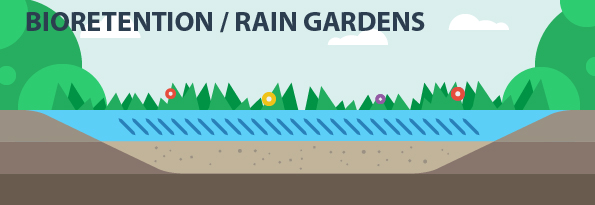Beth Shalom Rain Garden Expansion

Parts of the Chesapeake Bay watershed contain a high percentage of impervious cover – paved or other hard surfaces such as roofs and roadways that prevent rain water from being absorbed into the ground. Instead, water runs along these surfaces, collecting trash and substances such as motor oil, lawn fertilizers, and pesticides. This polluted stormwater flows into streams and rivers, where it threatens aquatic ecosystems and public health.
Effective stormwater management, on the other hand, creates safe paths for polluted runoff to be captured and filtered through the ground before it reaches waterways. This helps keep the environment clean and our communities healthy!

Project Location: Columbia, MD
Problem: The congregation of Beth Shalom had a rain garden installed in 2012, but the garden was proving inadequate to manage runoff from the facility’s large roof. As a result, the grounds were becoming eroded during rain storms.
Solution: The Howard County READY (Restoring the Environment and Developing Youth) Program – which provides summer employment for high school and college students – helped retrofit Beth Shalom’s rain garden. Two-foot wide auger holes were drilled in the ground and filled with stone to facilitate greater infiltration, and the garden was also expanded to handle greater stormwater volumes. Thanks to these improvements, drainage issues on the property have been completely resolved. Ongoing maintenance will be provided by READY’s Garden Maintenance Program, which will visit the site 4-6 times per year.
Partners: Howard EcoWorks; Howard County READY (Restoring the Environment and Developing Youth) Program; People Acting Together in Howard (PATH)
Scale: 300 square foot bioretention area
Cost: $4,980
Funding Sources: Howard County stormwater fees

